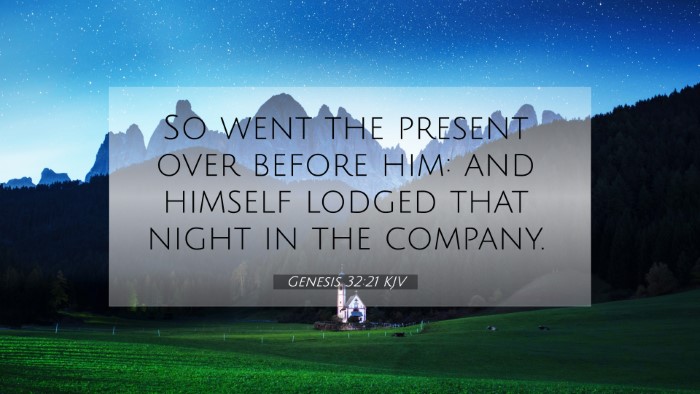Understanding Genesis 32:21
In the verse Genesis 32:21, we find Jacob preparing to meet his estranged brother Esau after many years of separation. This passage provides significant insights into the nature of reconciliation, humility, and divine protection. Below is an exploration of its meanings based on selected public domain commentaries.
Verse Context
Genesis 32:21 states:
“So the present went on before him, and he himself lodged that night in the camp.”
This verse comes at a pivotal moment in Jacob's life, highlighting his strategic approach to deal with potential hostility from Esau, while also showing his reliance on God’s promise.
Commentary Insights
Below are summarized interpretations from noted biblical commentators:
- Matthew Henry: Henry emphasizes the importance of Jacob's humility during this encounter, focusing on how his thoughtful preparations and offerings demonstrate a desire for peace with Esau. He suggests that Jacob sought to appease his brother with gifts, illustrating a principle of reconciliation that involves selflessness and preparation.
- Albert Barnes: Barnes notes that Jacob's actions indicate a mix of faith and prudence. He interprets the presents sent ahead as tokens of goodwill designed to soften Esau's heart. Barnes also discusses the underlying theme of trust in God’s protection, highlighting how Jacob, despite his fear, still believed in the Lord's promises.
- Adam Clarke: Clarke reflects on the significance of Jacob staying behind despite sending gifts forward. He argues this placement shows Jacob's reliance on prayer and divine intervention above his own scheming. Clarke connects this moment to the overarching narrative of divine faithfulness throughout Jacob's life, underscoring key theological themes such as God's providence and mercy.
Thematic Connections
This verse connects with various themes in the Bible, highlighting important lessons on reconciliation, reliance on God, and humility. Below are several key biblical cross-references that inform our understanding of Genesis 32:21:
- Genesis 33:4: Esau's warm reception of Jacob indicates the success of Jacob’s efforts for reconciliation.
- Romans 12:18: This verse advises believers to strive for peace with others, resonating with Jacob's approach.
- James 4:10: This verse teaches humility before the Lord, a characteristic shown by Jacob in his actions.
- Philippians 4:6-7: Paul's exhortation to present requests to God mirrors Jacob's dedication to God during a time of anxiety.
- Proverbs 16:7: The principle that pleasing God leads to favorable outcomes, as seen in the resolution of Jacob's fears.
- 2 Corinthians 5:18: The ministry of reconciliation aligns with Jacob's desire to mend his relationship with Esau.
- Matthew 5:9: Blessed are the peacemakers, showing a biblical mandate for reconciliation that Jacob exemplifies.
- Luke 17:3: The call to rebuke and forgive relates to the theme of reconciliation central in this narrative.
- Hebrews 12:14: Pursuing peace and holiness is echoed in Jacob’s actions as he seeks to rectify past wrongs.
- Genesis 28:15: God’s promise to be with Jacob reinforces Jacob’s hope and reliance on God amid his fears.
Practical Applications
From this analysis, readers can derive several practical applications:
- Preparation for Reconciliation: Like Jacob, preparing for reconciliation with others requires intentionality and humility.
- Trust in Divine Protection: In moments of uncertainty, believers are reminded to trust in God's promises and providence.
- Seeking Peace: Actively seeking to mend relationships reflects the heart of a believer committed to God's ways.
- Humility in Conflict: Approaching conflicts with humility ensures that interactions lead towards constructive resolutions.
Conclusion
Genesis 32:21 serves as a profound reminder of the complexity of human relationships and the divine oversight in our struggles. The insights drawn from public domain commentaries and cross-referenced scripture enhance our understanding of how God requires us to approach reconciliation—not just with our actions but with a heart attuned to His presence and promises. Readers are encouraged to explore these connections further, using tools such as a Bible concordance or a cross-reference guide to enrich their studies.
Engaging in cross-referencing biblical texts can deepen our understanding of scripture. As we explore connections between Bible verses, we discover a cohesive narrative that guides our faith and relationships.


